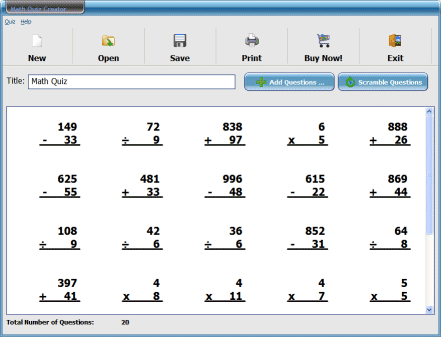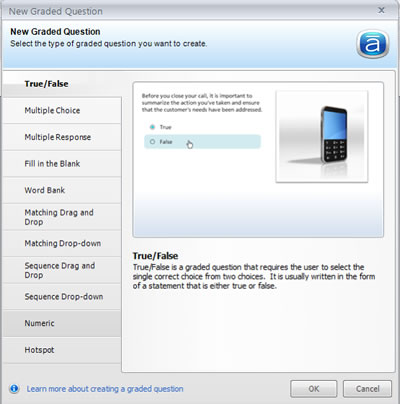![]() We all know what a quiz is. It’s a test of knowledge, typically accomplished by asking a series of questions.
We all know what a quiz is. It’s a test of knowledge, typically accomplished by asking a series of questions.
Quizzes are popular in the digital environment, not least because computers find it so easy to deliver the questions and score the answers. In fact, if you were in your first week of a programming course, you’d probably have a go at putting together a multiple choice quiz. Quizzes are an entertaining diversion, particularly when delivered within the context of a game, with rules, levels, competition and prizes, but they can also play a useful role within a learning solution. A function that is often abused, perhaps, but the potential is there.

Media elements
Although many quizzes are primarily textual, the possibility is there to use every media element. Images can provide the basis for questions that test for recognition of people, objects or places or to locate elements within interfaces and other spaces. Video can be used to portray situations that test the learner’s ability to make critical judgements. Audio can be employed to check for recognition of voices or pieces of music. A variety of media can also be used to introduce questions and provide feedback.
Interactive capability
Quizzes are essentially interactive. They serve their function in testing knowledge only by eliciting responses from learners. Just about any input device imaginable can be used as the basis for that interaction – key presses, mouse clicks, touches, the lot.
Applications
The most common application for a quiz is as a test of mastery. This is fine in principle as long as it really is possible for the knowledge and skills in question to be assessed by the sort of questions that a computer can deliver. To state the obvious, you might be able to check that a pilot understands the principles of aerodynamics using a quiz, but you can’t check they can fly the plane. Some caution also needs to be taken in terms of when a quiz is delivered. If the quiz comes right after the delivery of content (and the learner knows it’s coming), it is all too easy for the learner to hold on to enough of the information to get them through the quiz, but then forget it all the day after. We can probably all remember how possible it was to cram in information before an exam, only to see that evaporate almost as soon as we committed it to paper. A much more valid test of knowledge comes weeks, months or years after original exposure to the information.

Although their potential is rarely exploited to the full, quizzes can actually play a useful role at just about every stage in the learning process:
- As a way, right up front, for the learner to find out how much they already know and how much they need to know. This sort of diagnostic pre-test not only demonstrates the need for learning, it helps to direct the learner to content that is likely to be most useful.
- As a vehicle for delivering the learning content itself. One way to create an engaging lesson is to use a series of quiz questions to challenge and then build on the learner’s prior knowledge. Every question alerts the learner to a gap to fill and all you have to do is oblige.
- As a means for repetitive drill and practice. Unlike teachers, computers never get bored asking questions and they don’t lose their patience when the learner takes a little longer than expected to get the point. In the classroom, most knowledge is under-rehearsed and most skills under-practised. Quizzes represent a good way to remedy that.
So how do I get started?
There is no shortage of tools for creating quizzes. Most cover the usual range of questions types – multi-choice, multi-answer, free text response, sequencing, matching, selecting hotspots and all sorts of variations. All e-learning authoring tools come with a quiz making capability, plus there are specialist stand-alone tools, including ones that you can use for high-stakes assessments or for quiz games.

In practice, it’s likely that tools will be the least of your problems. Writing the questions is a much more challenging task, and that’s where we’ll be directing our attention next.
Coming in part 2: using the correct question for the job
